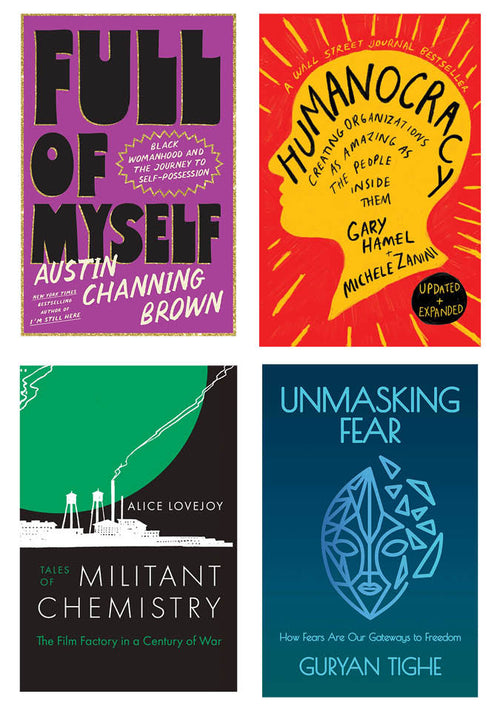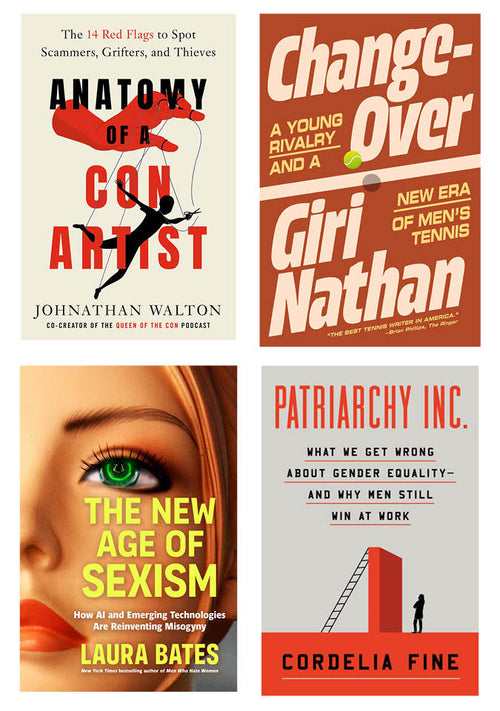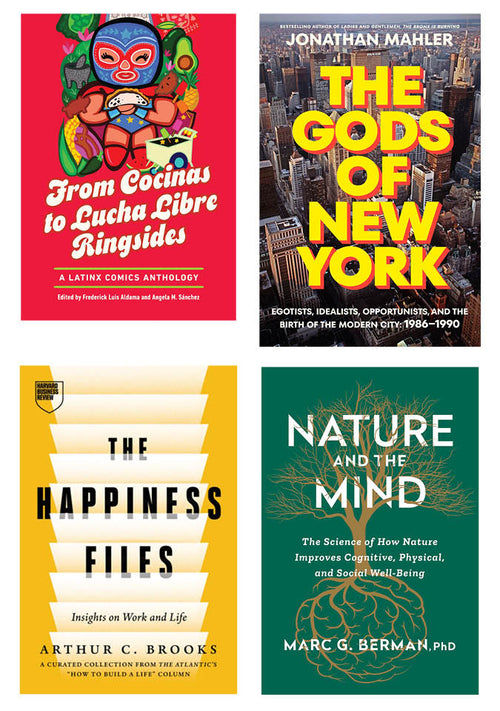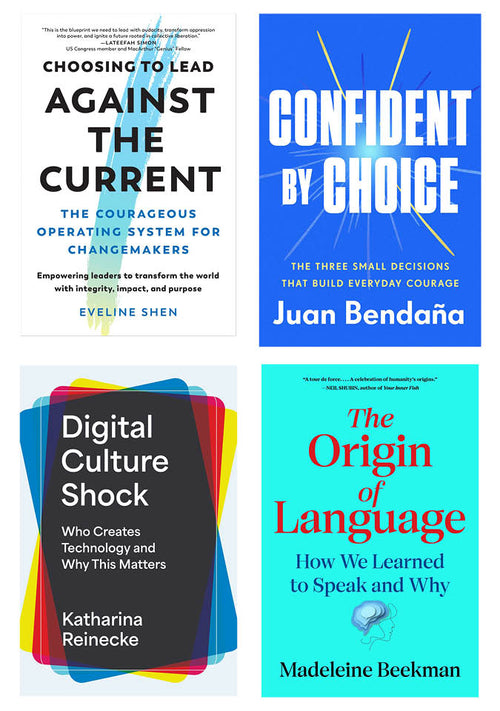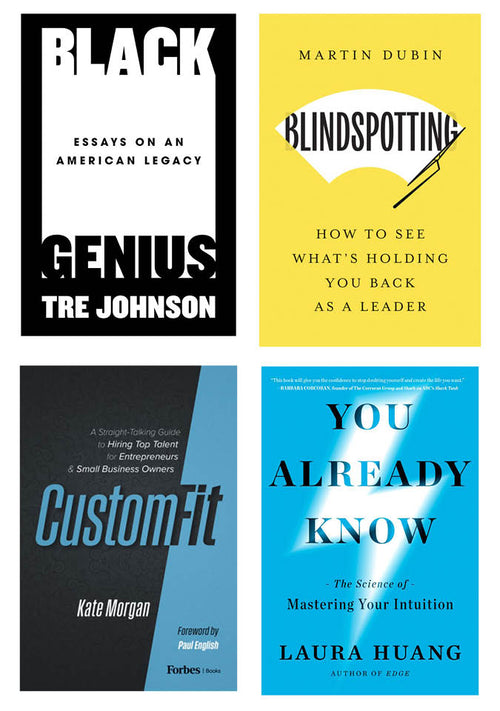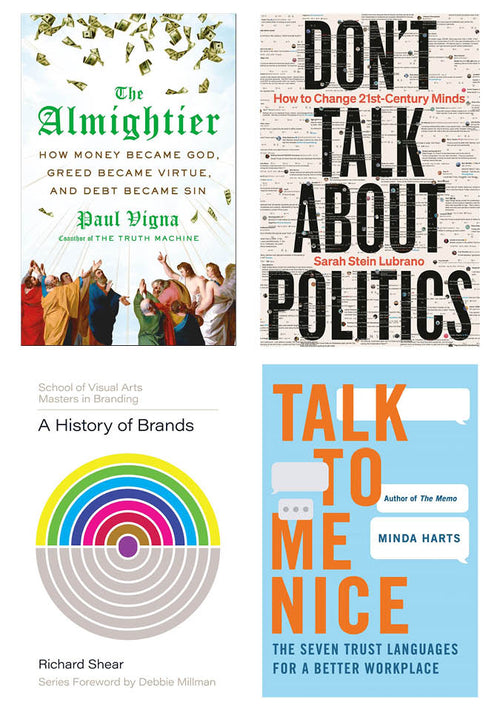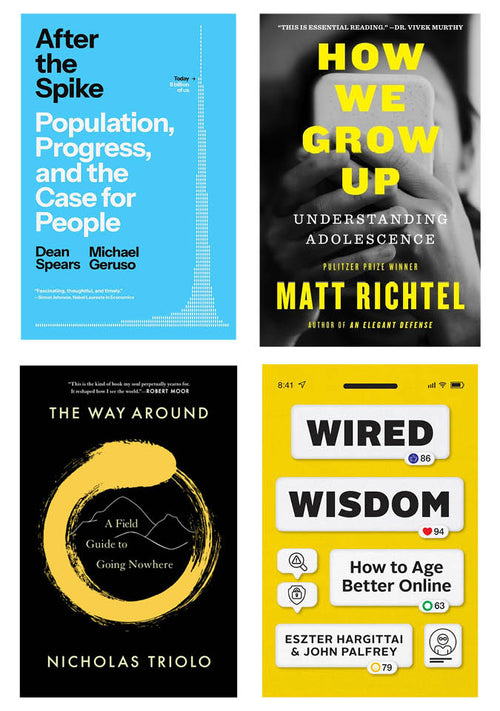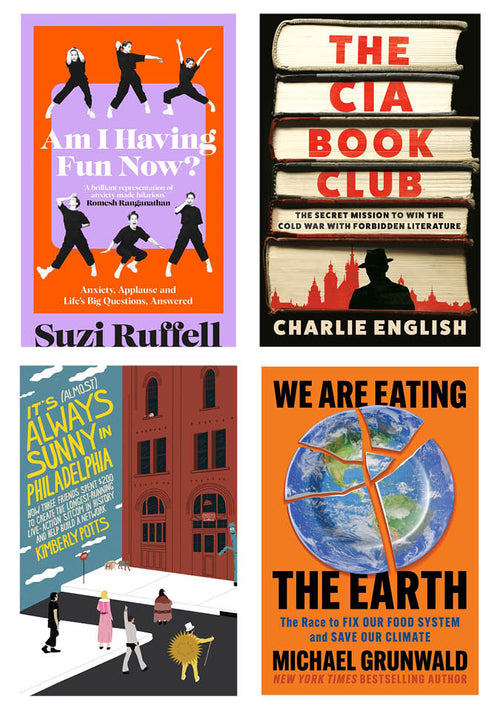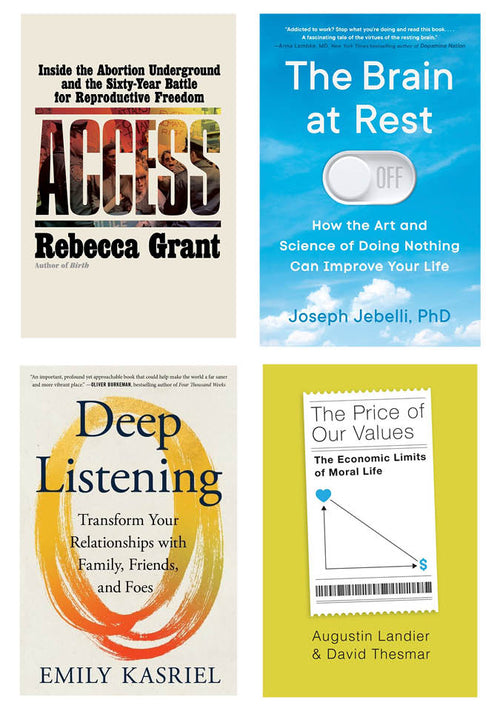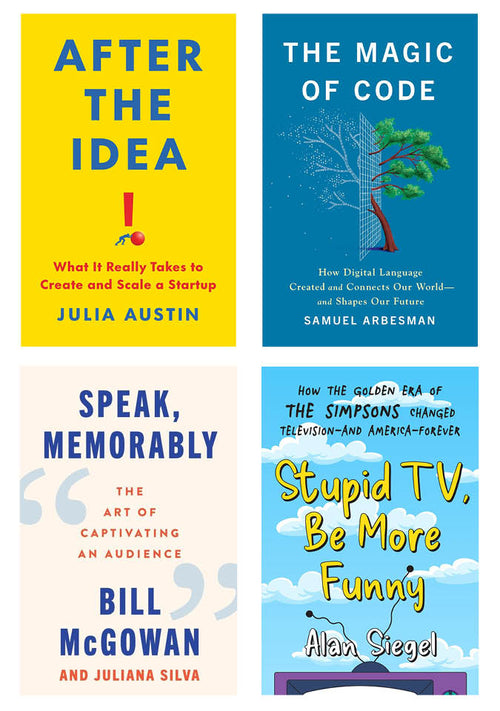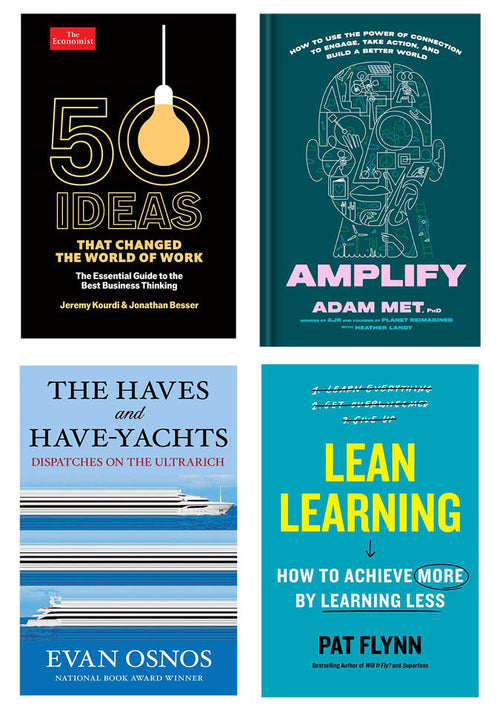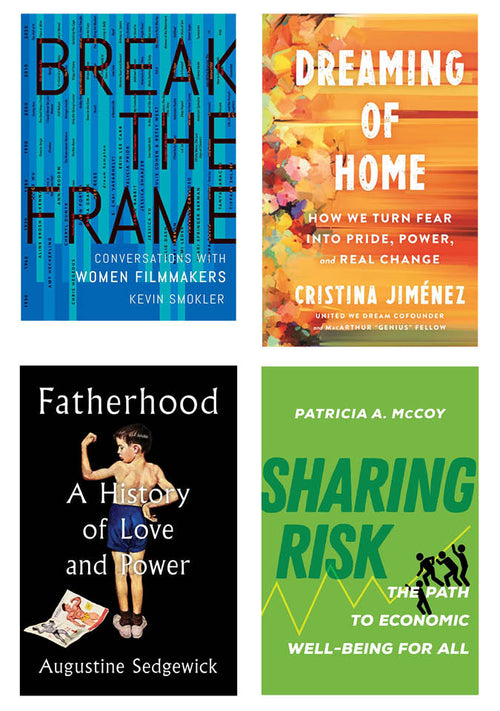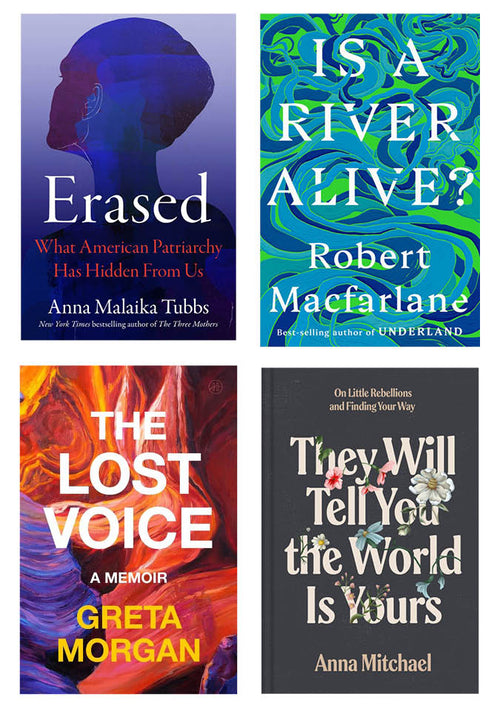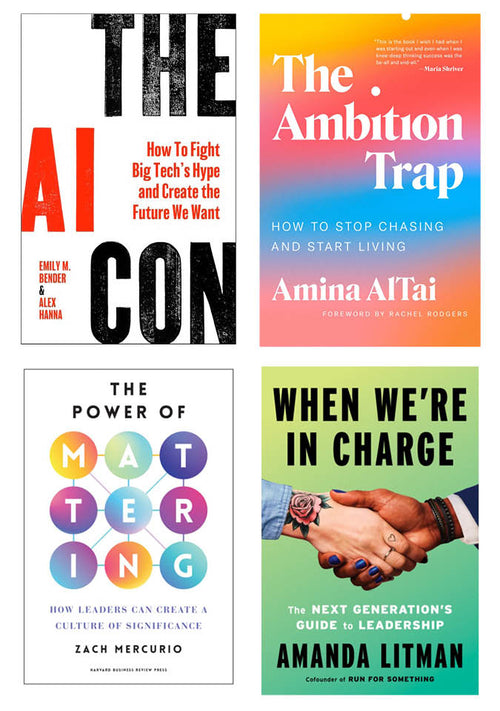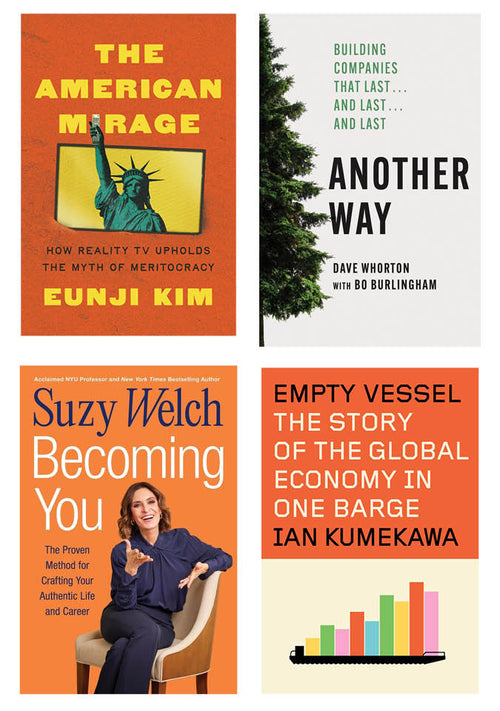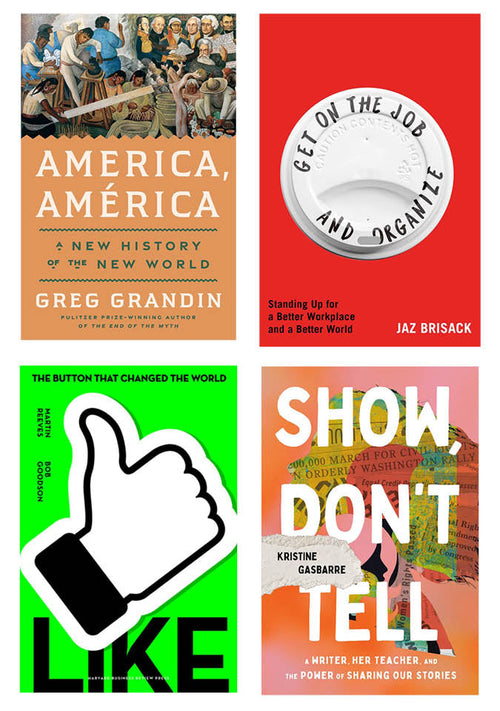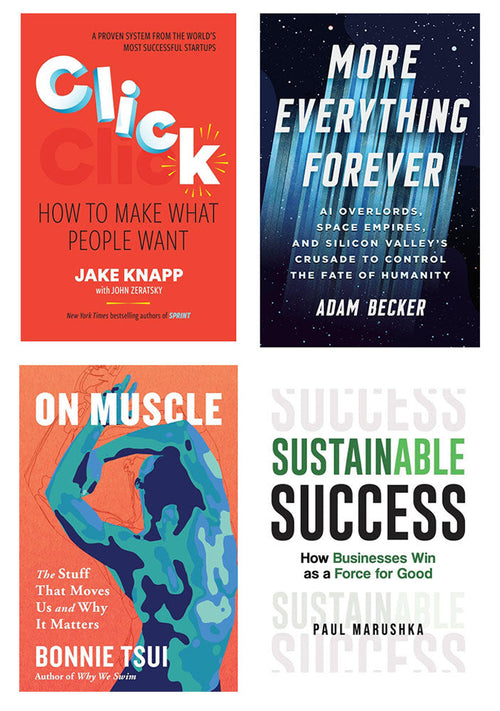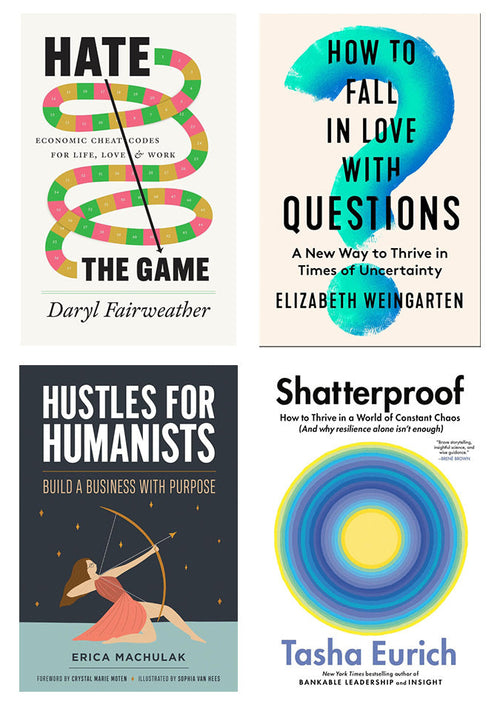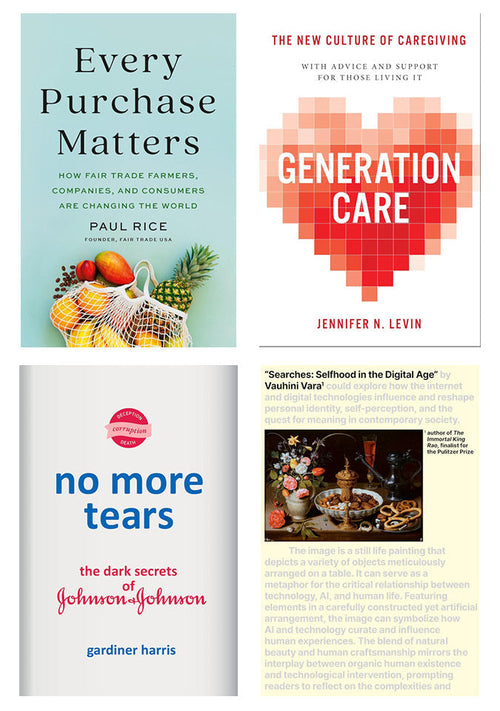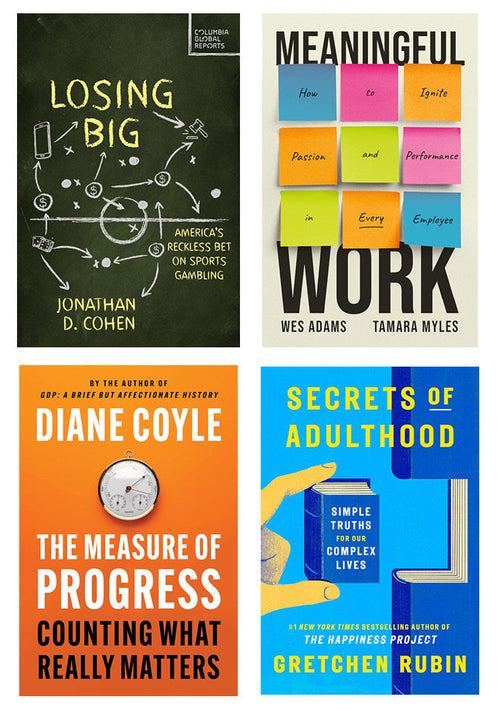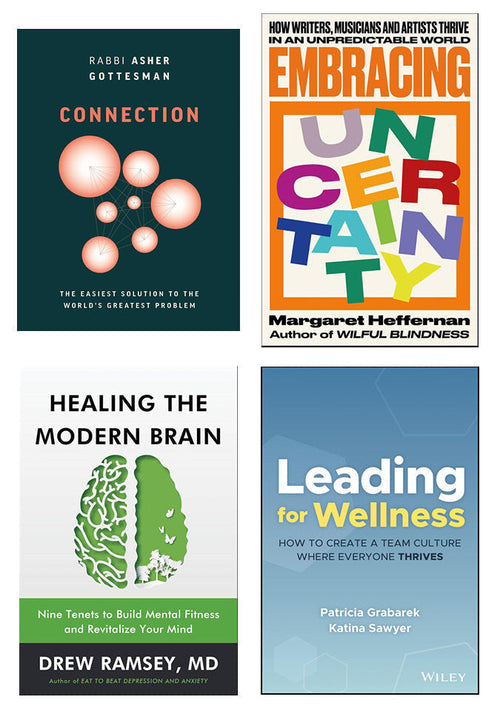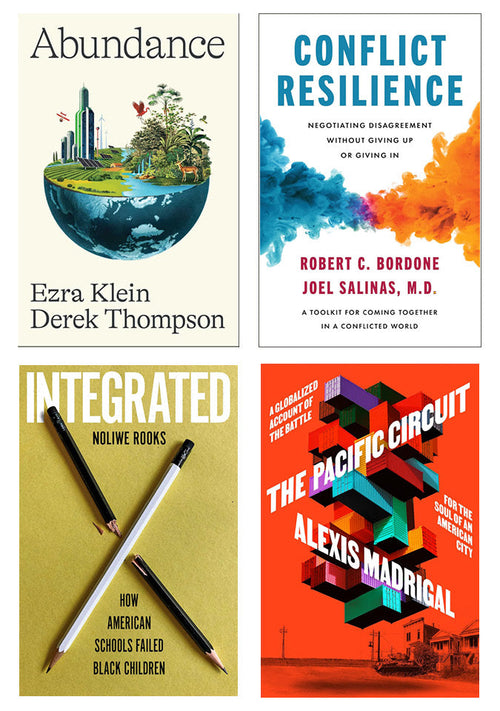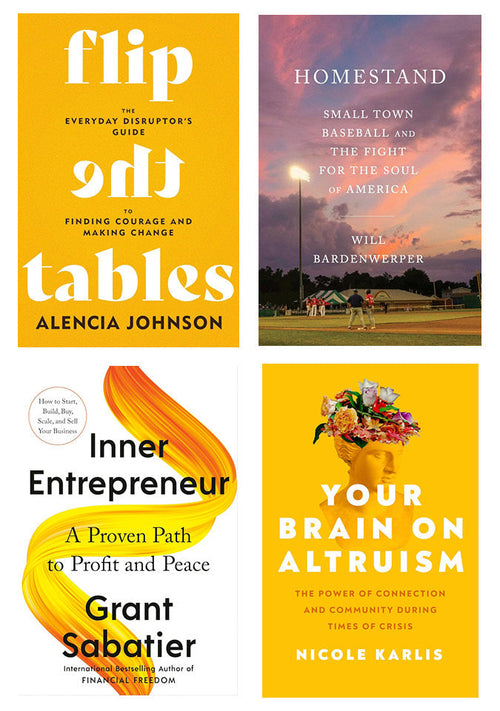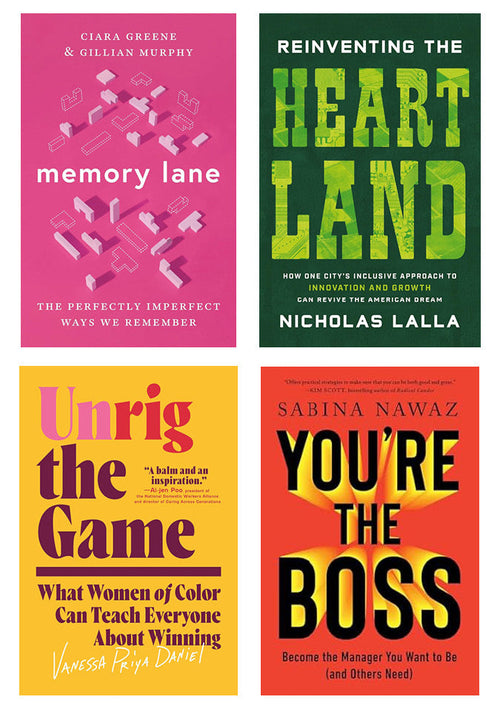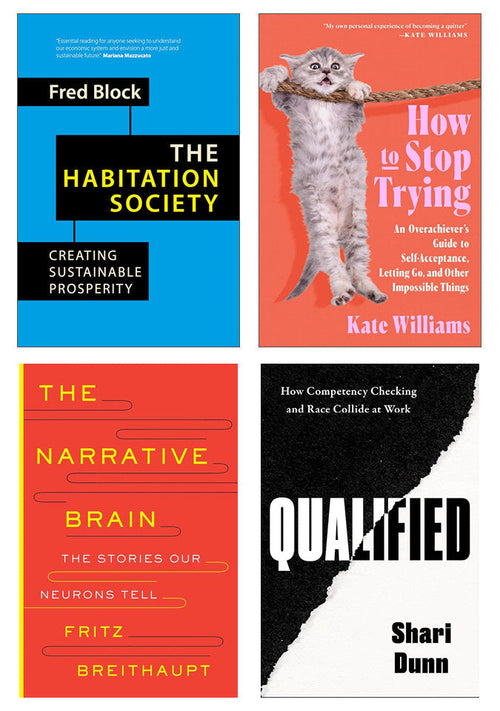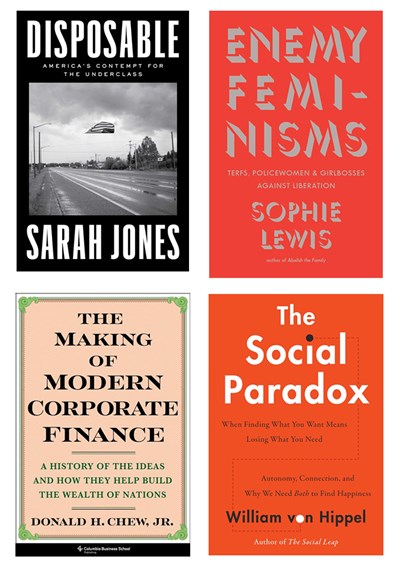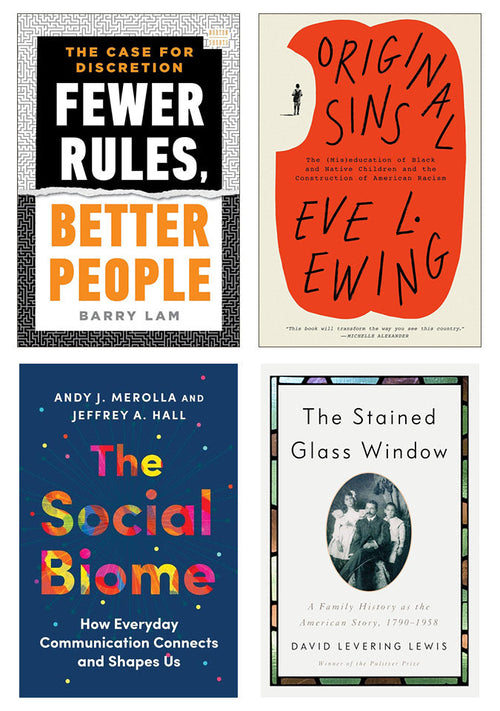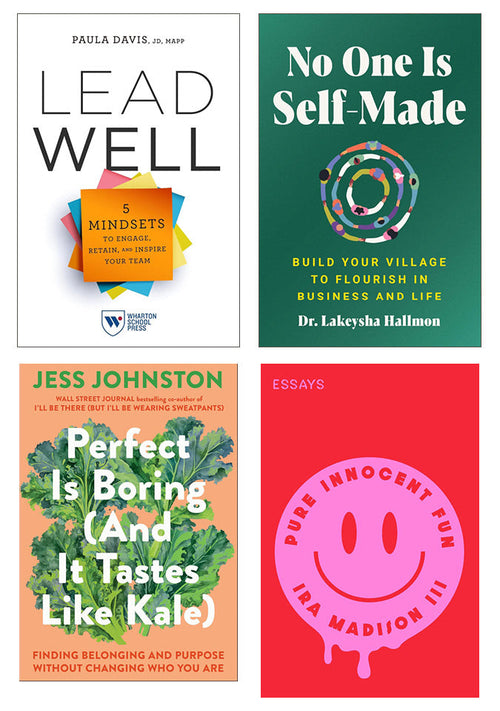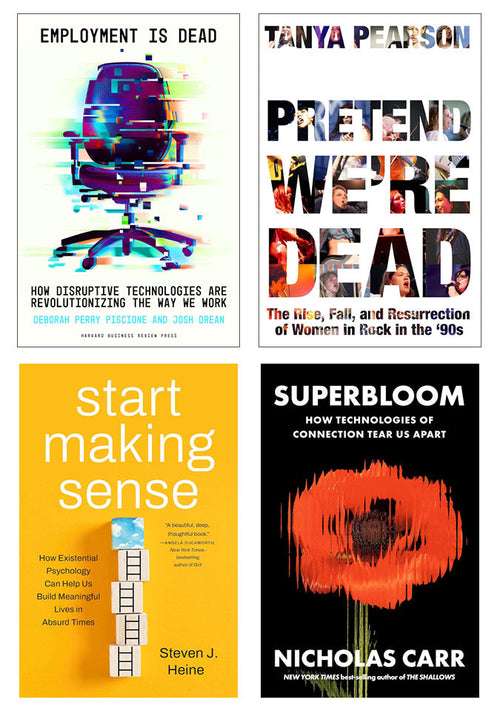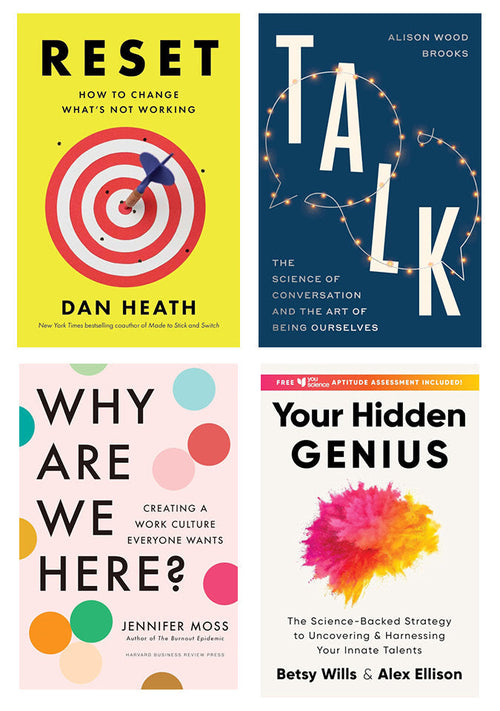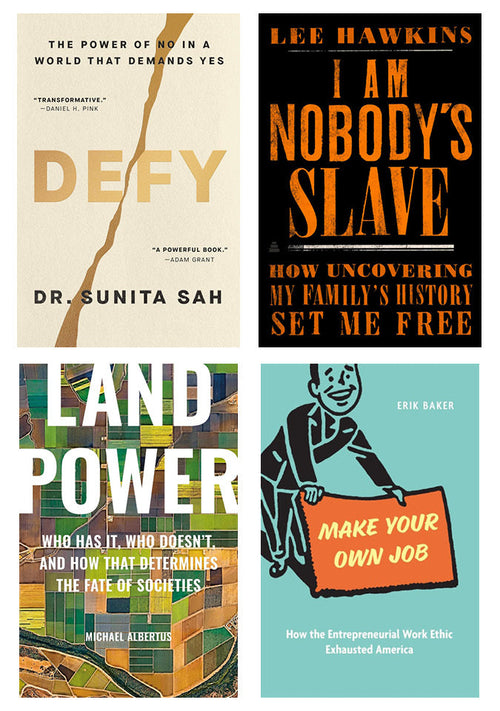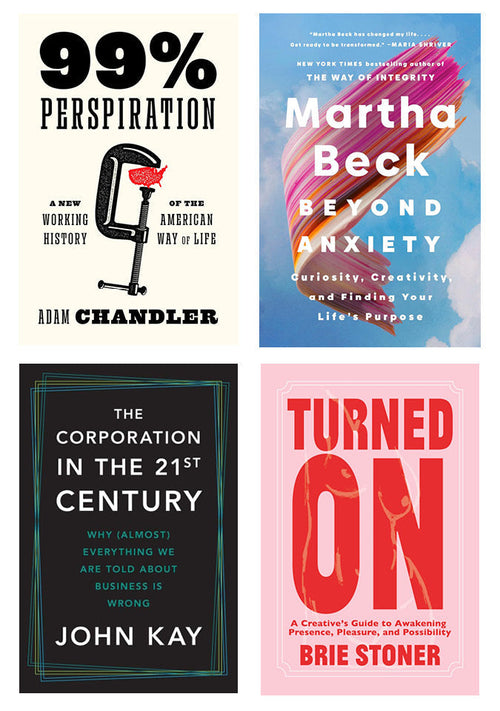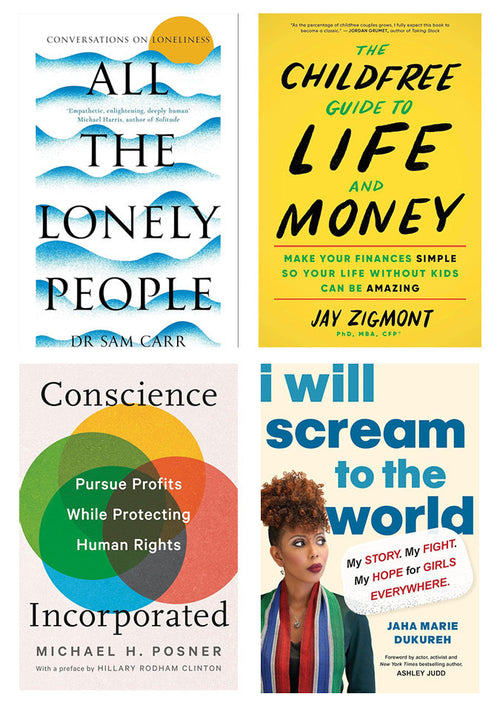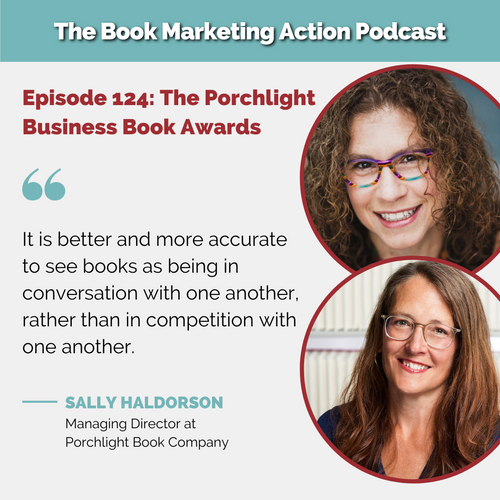Business Books to Watch in September
After the summer lull, September always brings a bounty of new book releases. In order of publication date, these are just 20 of the new books we'll be looking at more closely this month.
 Bored and Brilliant: How Spacing Out Can Unlock Your Most Productive and Creative Self by Manoush Zomorodi, St. Martin's Press
Bored and Brilliant: How Spacing Out Can Unlock Your Most Productive and Creative Self by Manoush Zomorodi, St. Martin's Press
WNYC's Note to Self host, Manoush Zomorodi, gives readers permission to unplug from their devices, get bored, and tap into a greater storehouse of creativity.
Has your smart phone become your BFF? Do you feel bored when you’re not checking Facebook or Instagram? Do you feel that the constant ping of social networks is sapping your creativity and ability to think? In 2015, Note To Self podcast host Manoush Zomorodi led thousands of her listeners with the same problems through a week of experiments designed to help them rethink their technology habits, unplug for part of each week and jumpstart their creativity. Bored and Brilliant: Rediscovering the Lost Art of Spacing Out explains the connection between boredom and being unplugged and how that state of mind can ignite original thinking. Through interviews with scientists, famous artists, and regular people, Zomorodi explores why putting greater emphasis on “doing nothing” is vital in an age of constant notifications and digital distractions. She speaks with scientists who have researched the links between boredom and creativity. She spends time with a museum security guard who knows how to turn standing in a sometimes-empty room for eight hours into an exercise in creative thinking. She also explores how we can harness boredom’s hidden benefits to become our most productive selves. Throughout the book are a series of challenges that will help readers rethink their relationship to their devices without completely leaving the digital world. Bored and Brilliant: It's permission to unplug.
 How to Be Happy at Work: The Power of Purpose, Hope, and Friendship by Annie McKee, Harvard Business Review Press
How to Be Happy at Work: The Power of Purpose, Hope, and Friendship by Annie McKee, Harvard Business Review Press
Life’s too short to be unhappy at work
“I’m working harder than I ever have, and I don't know if it’s worth it anymore.” If you’re a manager or leader, these words have probably run through your mind. So many of us are feeling fed up, burned out, and unhappy at work: the constant pressure and stress, the unending changes, the politics—people feel as though they can't give much more, and performance is suffering.
But it’s work, after all, right? Should we even expect to be fulfilled and happy at work?
Yes, we should, says Annie McKee, coauthor of the bestselling Primal Leadership. In her new transformative book, she makes the most compelling case yet that happiness?and the full engagement that comes with it?is more important than ever in today’s workplace, and she sheds new light on the powerful relationship of happiness to individual, team, and organizational success.
Based on extensive research and decades of experience with leaders, this book reveals that people must have three essential elements in order to be happy at work:
- A sense of purpose and the chance to contribute to something bigger than themselves
- A vision that is powerful and personal, creating a real sense of hope
- Resonant, friendly relationships
With vivid and moving real-life stories, the book shows how leaders can use these powerful pillars to create and sustain happiness even when they’re under pressure. By emphasizing purpose, hope, and friendships they can also ensure a healthy, positive climate for their teams and throughout the organization.
How to Be Happy at Work deepens our understanding of what it means to be truly fulfilled and effective at work and provides clear, practical advice and instruction for how to get there—no matter what job you have.
 The Potential Principle: A Proven System for Closing the Gap Between How Good You Are and How Good You Could Be by Mark Sanborn, Thomas Nelson
The Potential Principle: A Proven System for Closing the Gap Between How Good You Are and How Good You Could Be by Mark Sanborn, Thomas Nelson
The ultimate strategy for succeeding in your personal and professional life.
Are you living up to your true potential? Do you feel like you have more potential? You may be the best in your field—the best athlete, scholar, CEO, parent, mathematician, teacher, or mechanic. But that doesn't mean you can't still be better; you haven't maximized your potential.
Leadership expert and international bestselling author of The Fred Factor and You Don't Need a Title to Be a Leader, Mark Sanborn invites you to get better and close the gap between how good you are and how good you can be.
Teaching you to employ Sanborn's uniquely designed "Potential Matrix" to specific areas of your life, The Potential Principle provides you with the tools you need to see breakthrough improvement in key areas of your life.
One of the most exciting opportunities is right in front of you every day: pursuing your true potential. You're on your way. You can make your best second-best. You can be better.
 Unleashing the Innovators: How Mature Companies Find New Life with Startups by Jim Stengel with Tom Post, Crown Business
Unleashing the Innovators: How Mature Companies Find New Life with Startups by Jim Stengel with Tom Post, Crown Business
Today’s mature, established companies must find ways to rejuvenate themselves—or risk losing their way.
By working with startup companies, legacy companies can acquire new technology and lines of business, relearn the need for speed, increase strategic risk-taking, spark innovation, improve the intimacy of their relationships with customers, and streamline their operations from within.
Former global marketing officer for Procter and Gamble and business consultant Jim Stengel saw firsthand the importance of establishing partnerships and learning key insights from the startup world. In an eye-opening book, he looks at such established companies as GE and Western Union, Wells Fargo and IBN, Target and Motorola Solutions, Toyota and Bayer to see what they are learning from their alliances with entrpreneurs and startups—as well as the potential pitfalls and course corrections when a partnership goes awry. Jim closes by looking at how 10, 20, and 30-year-old “startups” like Microsoft, Google, and Apple are reinventing themselves—and what that bodes for legacy companies everywhere.
 Streampunks: YouTube and the Rebels Remaking Media by Robert Kyncl with Maany Peyvan, Harper Business
Streampunks: YouTube and the Rebels Remaking Media by Robert Kyncl with Maany Peyvan, Harper Business
An entertainment and tech insider—YouTube’s chief business officer—delivers the first detailed account of the rise of YouTube, the creative minds who have capitalized on it to become pop culture stars, and how streaming video is revolutionizing the media world.
In the past ten years, the internet video platform YouTube has changed media and entertainment as profoundly as the invention of film, radio, and television did, more than six decades earlier. Streampunks is a firsthand account of this upstart company, examining how it evolved and where it will take us next.
Sharing behind the scenes stories of YouTube’s most influential stars—Streampunks like Tyler Oakley, Lilly Singh and Casey Neistat—and the dealmakers brokering the future of entertainment like Scooter Braun and Shane Smith, Robert Kyncl uses his experiences at three of the most innovative media companies, HBO, Netflix, and YouTube, to tell the story of streaming video and this modern pop culture juggernaut. Collaborating with Google speechwriter Maany Peyvan, Kyncl explains how the new rules of entertainment are being written and how and why the media landscape is radically changing, while giving aspiring Streampunks some necessary advice to launch their own new media careers.
Kyncl persuasively argues that, despite concerns about technology impoverishing artists or undermining artistic quality, the new media revolution is actually fueling a creative boom and leading to more compelling, diverse and immersive content. Enlightening, surprising, and thoroughly entertaining, Streampunks is a revelatory ride through the new media rebellion that is reshaping our world.
 Design Thinking for the Greater Good: Innovation in the Social Sector by Jeanne Liedtka, Daisy Azer, Randy Salzman, Columbia University Press
Design Thinking for the Greater Good: Innovation in the Social Sector by Jeanne Liedtka, Daisy Azer, Randy Salzman, Columbia University Press
Facing especially wicked problems, social-sector organizations are searching for powerful new methods to understand and address them. Design Thinking for the Greater Good goes in depth on both the how of using new tools and the why.
As a way to reframe problems, ideate solutions, and iterate toward better answers, design thinking is already well established in the commercial world. Through ten stories of struggles and successes in fields such as health care, education, agriculture, transportation, social services, and security, the authors show how collaborative creativity can shake up even the most entrenched bureaucracies—and provide a practical roadmap for readers to implement these tools.
The design thinkers Jeanne Liedtka, Randy Salzman, and Daisy Azer explore how major agencies like the Department of Health and Human Services and the Transportation and Security Administration in the United States, as well as organizations in Canada, Australia, and the United Kingdom, have instituted principles of design thinking. In each case, these groups have used the tools of design thinking to reduce risk and manage change, use resources more effectively, bridge the communication gap between parties, and manage the competing demands of diverse stakeholders. Along the way, they have improved the quality of their products and enhanced the experiences of those they serve. These strategies are accessible to analytical and creative types alike, and their benefits extend from an organization's executives to its lowest-level staffers. This book will help today's leaders and thinkers implement these practices in their own pursuit of creative solutions that are both innovative and achievable.
 Find Your Why: A Practical Guide for Discovering Purpose for You and Your Team by Simon Sinek, David Mead, and Peter Docker, Portfolio
Find Your Why: A Practical Guide for Discovering Purpose for You and Your Team by Simon Sinek, David Mead, and Peter Docker, Portfolio
This paperback original workbook is the next step for applying the life-changing lessons of the mega-bestseller Start With Why, which has sold nearly a million copies worldwide.
With Start With Why, Simon Sinek inspired a movement to build a world in which the vast majority of us can feel safe while we are at work and fulfilled when we go home at night. However, many people had one major question after finishing the book—how do I bring Start With Why’s message to my own career and company? Along with two of his colleagues, Peter Docker and David Mead, Simon Sinek has created a hands-on guide to the most important step any business can take: finding your why.
This engaging workbook starts with the search for your personal why, and then expands to helping your colleagues find your business’s why. With detailed instructions at every stage in the process, the workbook also answers common concerns, such as: What if my why sounds like my competitor’s? Can you have more than one why? And, if my work doesn’t match my why, what do I do?
Whether you’re at an entry level position or a CEO, whether your team is run by the founder or a recent hire, the exercises in this book will lead you on a path to a more fulfilling life and long-term success for you and your colleagues.
 The Innovation Blind Spot: Why We Back the Wrong Ideas—and What to Do About It by Ross Baird, BenBella Books
The Innovation Blind Spot: Why We Back the Wrong Ideas—and What to Do About It by Ross Baird, BenBella Books
Our innovation economy is broken. But there’s good news: The ideas that will solve our problems are hiding in plain sight.
While big companies in the American economy have never been more successful, entrepreneurial activity is near a 30-year low. More businesses are dying than starting every day. Investors continue to dump billions of dollars into photo-sharing apps and food-delivery services, solving problems for only a wealthy sliver of the world’s population, while challenges in health, food security, and education grow more serious.
In The Innovation Blind Spot, entrepreneur and venture capitalist Ross Baird argues that the innovations that truly matter don’t see the light of day—for reasons entirely of our own making. A handful of people in a handful of cities are deciding, behind closed doors, which entrepreneurs get a shot to succeed. And most investors are what Baird calls “two-pocket thinkers”—artificially separating their charitable work from their day job of making a profit.
The resulting system creates rising income inequality, stifled entrepreneurial ambition, social distrust, and political uncertainty. Our innovation problem makes all our other problems harder to solve. In this book, Baird demonstrates how and where to find better ideas by lifting up people, places, and industries that are often overlooked. What’s more, Baird ultimately outlines how to create long-term success through “one-pocket thinking”—eliminating the blind spot that separates “what we do for a living” and “what we really care about.”
 It Takes a Tribe: Building the Tough Mudder Movement by Will Dean, Portfolio
It Takes a Tribe: Building the Tough Mudder Movement by Will Dean, Portfolio
The founder of Tough Mudder—the world’s greatest obstacle course races—takes us inside his unconventional company and reveals the secret to exponential growth is to turn your customers into tribes.
With a lot of moxie and mud, Will Dean founded Tough Mudder in 2008. Shunning the advice of his business school professors, who told him he was crazy, Dean was determined not to follow his fellow Harvard Business School classmates to Wall Street or Silicon Valley. Instead, he staged the first Tough Mudder event in Allentown, Pennsylvania, building an obstacle course that included a plunge into ice water and a slide down the side of a mountain, and ended with a sprint through flaming stacks of hay bales.
It might sound like torture, but early participants loved it, and came back for more—much more. More than 2.5 million people on three continents have now done at least one Tough Mudder event, with new “Mudders” joining the tribe every day.
The company’s astoundingly rapid growth might seem inexplicable until you experience the camaraderie, iconoclastic spirit, and pure adrenaline of a Tough Mudder event. Dean has created not only a revolutionary business model but a true phenomenon: a true global tribe. His book reveals, among other things…
- why challenge, not competition, is the key to inspiring communities.
- how to constantly innovate to stand out in a crowded market.
- how to inspire the kind of deep brand loyalty that leads to tattooed logos.
Dean’s entrepreneurial story isn’t a typical case study. The book is filled with colorful adventures and counterintuitive advice for every entrepreneur who wants to build a truly unique tribal business.
 Finish: Give Yourself the Gift of Done by Jon Acuff, Portfolio
Finish: Give Yourself the Gift of Done by Jon Acuff, Portfolio
From New York Times bestselling author Jon Acuff, a book for those who want relief from always starting and never being done.
Jon Acuff, sought-after speaker and consultant, is the friend who always gives you great advice. With his self-deprecating humor and charm, he has won over hundreds of thousands of followers, who come to him for both encouragement and a kick in the pants. Now, after showing you how to reboot your career in his New York Times bestseller Do Over, Acuff shows chronic starters how to actually finish their goals in an age of bottomless distractions and endless opportunities.
Acuff knows the reason why many writers’ novels go unfinished—it’s the same reason why gyms are filled in the first week of January, and empty by the end of the month, and why people stop learning a new language once they get past the easy parts. It’s not just that people lose momentum or get distracted. People give up on projects when they fail to live up to their own high expectations and decide that if they can’t do something perfectly they won’t do it at all. If you’re going to finish, you have to kill perfectionism.
Drawing on his popular 30 Days of Hustle course, Acuff teaches readers to short-circuit perfectionism and make it through to the end of a task. Whether it’s by “choosing what to bomb” or “cutting a goal in half,” he shows readers how to move past “the day after perfect,” get focused, and—finally—finish.
 World Without Mind: The Existential Threat of Big Tech by Franklin Foer, Penguin Press
World Without Mind: The Existential Threat of Big Tech by Franklin Foer, Penguin Press
Bestselling author Franklin Foer delivers a blistering and personal polemic against today’s monolithic technology companies, and the perilous ideas underpinning their megalomania.
Over the past few decades, the world has rushed headlong into the arms of an all-encompassing machine embrace. We shop with Amazon; socialize on Facebook; turn to Apple for entertainment; and rely on Google for information. These corporations speak of making the world better, and there’s no doubt their efficiency of has enabled an intoxicating level of daily convenience for many. Very little in our lives has not in some way been subject to this sudden algorithmic revolution. But that efficiency has not come without sacrifice. As the recent political events have demonstrated, the world is changing rapidly and unpredictably. In order to understand where our current path leads, we must understand the ideas that underpin these titanic companies. Technology is never ideologically neutral—least of all when it promises a utopian future.
Elegantly tracing the intellectual history of computer science—from the Descartes and the enlightenment to Alan Turing to Stuart Brand and the hippie origins of today’s Silicon Valley—Foer puts the DNA of the very idea of “tech” under the microscope. Google, Facebook, Apple, and Amazon, he argues, are not just trampling longstanding liberal values, but breaking laws intended protect intellectual property and privacy. Only a generation ago, their corporate ambitions would have been unimaginable: Google hopes to conquer death; Amazon provides cloud services to the CIA; Facebook mines us for data; Apple seeks to control everything we read, watch, and listen to. This is not the path towards freedom and prosperity, but the total automation and homogenization of our social, political, and intellectual lives.
There have been monopolists in the past—the robber barons of the 19th century, for example—but they merely sought profit. Today’s corporate giants hunt much bigger game. They want access to every facet of our identities and influence over every corner of our lives. Until now few have grasped the sheer scale of the threat, and even fewer still have understood the imperative of resistance. Taking no prisoners, Foer both indicts these companies, and shapes a path towards reining them in. At stake is nothing less than who we are, and what we will become.
 The Asshole Survival Guide: How to Deal with People Who Treat You Like Dirt by Robert I. Sutton, Houghton Mifflin Harcourt
The Asshole Survival Guide: How to Deal with People Who Treat You Like Dirt by Robert I. Sutton, Houghton Mifflin Harcourt
How to avoid, outwit, and disarm assholes, from the author of the classic bestseller The No Asshole Rule.
“Help, I’m dealing with an asshole! What can I do?”
Since his book The No Asshole Rule became a national bestseller a decade ago, Robert Sutton has heard that question asked in a thousand different ways. He answers the question in a new book that shifts focus from building civilized workplaces to providing relief for anybody who feels plagued and pushed around by assholes.
Equally useful and entertaining, The Asshole Survival Guide delivers a cogent and methodical game plan. Sutton starts with diagnosis—what kind of asshole problem, exactly, are you dealing with? From there, he provides field-tested, evidence-based, and sometimes surprising strategies for dealing with assholes—avoiding them, outwitting them, disarming them, sending them packing, and developing protective psychological armor. Sutton even teaches readers how to look inward to stifle their own inner jackass.
Ultimately, this survival guide is about developing an outlook and personal plan that will help you preserve the sanity in your work life, and will prevent all those perfectly good days from being ruined by some jerk.
 The Loyalist Team: How Trust, Candor, and Authenticity Create Great Organizations by Linda Adams, Abby Curnow-Chavez, Audrey Epstein, and Rebecca Teasdale wih Jody Berger, PublicAffairs
The Loyalist Team: How Trust, Candor, and Authenticity Create Great Organizations by Linda Adams, Abby Curnow-Chavez, Audrey Epstein, and Rebecca Teasdale wih Jody Berger, PublicAffairs
Great teams are built and maintained with great intention, though they can make it look deceptively easy.
Too many teams engage in dysfunctional behaviors or fall into territorialism, apathy, and unproductive relationships. The result? An overwhelmed, unengaged, and stressed-out workforce that settles for average or poor performance.
Here, four authors with a combined century of management experience show readers how every team can be extraordinary. The authors introduce their field-tested Loyalist Team 3D assessment that allows anyone to get to the heart of why teams break down, identify the weaknesses in their own team, and build a Loyalist Team. This kind of team has members who ensure each other's success as they work to ensure their own, operate with absolute candor, and value loyalty and authenticity to deliver results, create a healthy work environment, and help companies succeed. The Loyalist Team is a must-read for anyone who wants their team to achieve extraordinary results.
 The Memo: Five Rules for Your Economic Liberation by John Hope Bryant, Berrett-Koehler
The Memo: Five Rules for Your Economic Liberation by John Hope Bryant, Berrett-Koehler
America’s poor, working poor, and middle class are in a waiting game they cannot win. Jobs will not come, times will not get better, and communities will not flourish until they “get the memo”—that is, take charge of their own financial futures. Bestselling author John Hope Bryant (How the Poor Can Save Capitalism—40,000 copies sold) tells them how.
True power in this world comes from economic independence, but too many people have too much month left at the end of their money. John Hope Bryant, founder and CEO of Operation HOPE, illuminates the path toward liberation that is hiding in plain sight. His message is simple: the supermajority of people who live in poverty, whom Bryant calls the invisible class, as well as millions in the struggling middle class, haven't gotten “the memo”—until now.
Building on his personal experience of rising up from economically disadvantaged circumstances and his work with Operation HOPE, Bryant teaches readers five rules that lay the foundation for achieving financial freedom. He emphasizes the inseparable connection between “inner capital” (mindset, relationships, knowledge, and spirit) and “outer capital” (financial wealth and property). “If you have inner capital,” Bryant writes, “you can never be truly poor. If you lack inner capital, all the money in the world cannot set you free.”
Bryant gives readers tools for empowerment by covering everything from achieving basic financial literacy to investing in positive relationships and approaching wealth with a completely new attitude. He makes this bold and controversial claim: “Once you have satisfied your basic sustenance needs—food, water, health, and a roof over your head—poverty has more to do with your head than your wallet.”
Bryant wants to restore readers' “silver rights,” giving them the ability to succeed and prosper no matter what very real roadblocks society puts in their way. We have more power than we realize, if only we can recognize and claim it. “We are our first capital,” Bryant writes. “We are the CEOs of our own lives.”
 No Ego: How Leaders Can Cut the Cost of Workplace Drama, End Entitlement, and Drive Big Results by Cy Wakeman, St. Martin's Press
No Ego: How Leaders Can Cut the Cost of Workplace Drama, End Entitlement, and Drive Big Results by Cy Wakeman, St. Martin's Press
New York Times bestselling author and leadership trainer says: Getting your employees to do their work shouldn't have to be so much, well, work!
For years now, leaders in almost every industry have accepted two completely false assumptions—that change is hard, and that engagement drives results. Those beliefs have inspired expensive attempts to shield employees from change, involve them in high-level decision-making, and keep them happy with endless satisfaction surveys and workplace perks. But what these engagement programs actually do, Cy Wakeman says, is inflate expectations and sow unhappiness, leaving employees unprepared to adapt to even minor changes necessary to the organization’s survival. Rather than driving performance and boosting efficiency, these programs fuel entitlement and drama, costing millions in time and profit. No Ego is about increasing awareness of just how often individuals are operating out of ego at work, breeding drama and discord rather than innovation and constructive collaboration.
It is high time to reinvent leadership thinking. The current work experience is so full of emotional waste that it’s seen as a foregone cost in today’s business environments. Cy Wakeman teaches straightforward strategies in which this time and energy can be re-commissioned and put toward the value that hired talent is intended to provide. No Ego disposes with unproven HR maxims, and instead offers a complete plan to turn your office from a den of discontent into a highly productive place where happy employees are accountable employees.
 Creating Great Choices: A Leader's Guide to Integrative Thinking by Jennifer Riel, Roger L. Martin, Harvard Business Review Press
Creating Great Choices: A Leader's Guide to Integrative Thinking by Jennifer Riel, Roger L. Martin, Harvard Business Review Press
A practical four-step methodology for any leader or manager facing a tough choice, and for creating integrative solutions to big, complex and pressing problems.
When it comes to our hardest choices, it can seem as though making trade-offs is inevitable. But what about those crucial times when accepting the obvious trade-off just isn't good enough? What do we do when the choices in front of us don't get us what we need? In those cases, rather than choosing the least worst option, we can use the models in front of us to create a new and superior answer. This is integrative thinking.
First introduced by world-renowned strategic thinker Roger Martin in The Opposable Mind, integrative thinking is an approach to problem solving that uses opposing ideas as the basis for innovation. Now, in Creating Great Choices, Martin and his longtime thinking partner Jennifer Riel vividly illustrate how integrative thinking works, and how to do it.
The book includes fresh stories of successful integrative thinkers that will demystify the process of creative problem solving, as well as practical tools and exercises to help readers engage with the ideas. And it lays out the authors' four-step methodology for creating great choices, which can be applied in virtually any context. The result is a replicable, thoughtful approach to finding a "third and better way" to make important choices in the face of unacceptable trade-offs.
Insightful and instructive, Creating Great Choices blends storytelling, theory, and hands-on advice to help any leader or manager facing a tough choice.
 Side Hustle: From Idea to Income in 27 Days by Chris Guillebeau, Crown Business
Side Hustle: From Idea to Income in 27 Days by Chris Guillebeau, Crown Business
The author of The $100 Startup shows how to launch a profitable side hustle—defined as any entrepreneurial venture that one can do alongside their more stable and steady job—in just 27 days.
Today it seems as though just about everyone dreams of being an entrepreneur. But without a steady flow of income it can be challenging to take the plunge. Side Hustle is the answer to those wishing to pursue their passions, make extra money, and enjoy the freedom of entrepreneurship without the risks of giving up a steady paycheck and going full throttle into the world of working for themselves.
In his travels, Chris talks with readers about entrepreneurship and living a freer, more adventurous life. And he’s yet to meet one whose eyes didn’t light up whenever he mentions the phrase “side hustle.” That’s because the allure of the side hustle is about much more than just making some extra cash; it’s about freedom and job security in today’s unstable business environment. That’s because when you receive income from multiple different sources, you are no longer dependent on the whims of a single employer. It affords you choices, and options.
In the style of The $100 Startup, full of practical exercises and peppered with inspiring stories, this book shows readers how to brainstorm, choose, implement, launch, and refine their side hustle in just 27 days—with little to no budget, and without having to quit their current job.
 Principles: Life and Work by Ray Dalio, Simon & Schuster
Principles: Life and Work by Ray Dalio, Simon & Schuster
Ray Dalio, one of the world’s most successful investors and entrepreneurs, shares the unconventional principles that he’s developed, refined, and used over the past forty years to create unique results in both life and business—and which any person or organization can adopt to help achieve their goals.
In 1975, Ray Dalio founded an investment firm, Bridgewater Associates, out of his two-bedroom apartment in New York City. Forty years later, Bridgewater has made more money for its clients than any other hedge fund in history and grown into the fifth most important private company in the United States, according to Fortune magazine. Dalio himself has been named to Time magazine’s list of the 100 most influential people in the world. Along the way, Dalio discovered a set of unique principles that have led to Bridgewater’s exceptionally effective culture, which he describes as “an idea meritocracy that strives to achieve meaningful work and meaningful relationships through radical transparency.” It is these principles, and not anything special about Dalio—who grew up an ordinary kid in a middle-class Long Island neighborhood—that he believes are the reason behind his success.
In Principles, Dalio shares what he’s learned over the course of his remarkable career. He argues that life, management, economics, and investing can all be systemized into rules and understood like machines. The book’s hundreds of practical lessons, which are built around his cornerstones of “radical truth” and “radical transparency,” include Dalio laying out the most effective ways for individuals and organizations to make decisions, approach challenges, and build strong teams. He also describes the innovative tools the firm uses to bring an idea meritocracy to life, such as creating “baseball cards” for all employees that distill their strengths and weaknesses, and employing computerized decision-making systems to make believability-weighted decisions. While the book brims with novel ideas for organizations and institutions, Principles also offers a clear, straightforward approach to decision-making that Dalio believes anyone can apply, no matter what they’re seeking to achieve.
Here, from a man who has been called both “the Steve Jobs of investing” and “the philosopher king of the financial universe” (CIO magazine), is a rare opportunity to gain proven advice unlike anything you’ll find in the conventional business press.
 Hit Refresh: The Quest to Rediscover Microsoft's Soul and Imagine a Better Future for Everyone by Satya Nadella, with Greg Shaw and Jill Tracie Nichols, Harper Business
Hit Refresh: The Quest to Rediscover Microsoft's Soul and Imagine a Better Future for Everyone by Satya Nadella, with Greg Shaw and Jill Tracie Nichols, Harper Business
Microsoft’s CEO tells the inside story of the company’s continuing transformation, tracing his own personal journey from a childhood in India to leading some of the most significant technological changes in the digital era.
Hit Refresh is about individual change, about the transformation happening inside of Microsoft and the technology that will soon impact all of our lives—the arrival of the most exciting and disruptive wave of technology humankind has experienced: artificial intelligence, mixed reality, and quantum computing.
It’s about how people, organizations, and societies can and must transform “hit refresh” in their persistent quest for new energy, new ideas, and continued relevance and renewal. At its core, it’s about us humans and how our one unique quality—empathy—will become ever more valuable in a world where technological advancement will disrupt the status quo as never before.
Satya Nadella explores a fascinating childhood before immigrating to the U.S. and how he learned to lead along the way. He then shares his meditations as sitting CEO—one who is mostly unknown following the brainy Bill Gates and energetic Steve Ballmer. He tells the inside story of how a company rediscovered its soul—transforming everything from culture to their fiercely competitive landscape and industry partnerships. Nadella concludes with his vision for the coming wave of technology and by exploring the potential impact to society and delivering call to action for world leaders.
“Ideas excite me,” Nadella explains. “Empathy grounds and centers me.” Hit Refresh is a reflection, meditations and series of recommendations presented as algorithms from a principled, deliberative leader searching for improvement—for himself, for a storied company and for society.
 Blue Ocean Shift: Beyond Competing - Proven Steps to Inspire Confidence and Seize New Growth by W. Chan Kim and Renee Mauborgne, Hachette Books
Blue Ocean Shift: Beyond Competing - Proven Steps to Inspire Confidence and Seize New Growth by W. Chan Kim and Renee Mauborgne, Hachette Books
The essential follow up to Blue Ocean Strategy, the classic and 3.6 million copy global bestseller by world-renowned professors W. Chan Kim and Renee Mauborgne.
Drawing on more than a decade of new work, Kim and Mauborgne show you how to move beyond competing, inspire your people's confidence, and seize new growth, guiding you step-by-step through how to take your organization from a red ocean crowded with competition to a blue ocean of uncontested market space. By combining the insights of human psychology with practical market-creating tools and real-world guidance, Kim and Mauborgne deliver the definitive guide to shift yourself, your team, or your organization to new heights of confidence, market creation, and growth. They show why nondisruptive creation is as important as disruption in seizing new growth.
Blue Ocean Shift is packed with all-new research and examples of how leaders in diverse industries and organizations made the shift and created new markets by applying the process and tools outlined in the book. Whether you are a cash-strapped startup or a large, established company, nonprofit or national government, you will learn how to move from red to blue oceans in a way that builds your people's confidence so that they own and drive the process.
With battle-tested lessons learned from successes and failures in the field, Blue Ocean Shift is critical reading for leaders, managers, and entrepreneurs alike. You'll learn what works, what doesn't, and how to avoid the pitfalls along the way. This book will empower you to succeed as you embark on your own blue ocean journey. Blue Ocean Shift is indispensable for anyone committed to building a compelling future.

